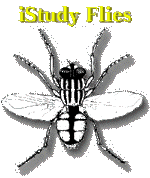|
iStudy Flies - Flies in General: Significance and Importance
FLIES IN GENERAL
Significance and Importance
Mosquitoes are also well known for their spread of yellow fever, encephalitis, and
elephantiasis. Flies that bite are especially harmful, because they can transmit
disease-causing
|

A female Tsetse fly
Image source: Peggy Greb, USDA
|
pathogens, such as when the mosquito spreads malaria. Parasitic worms
that cause blindness are carried by black flies. [14] Worldwide in their distribution, swarms
of flies seem to always appear. Sweat flies, houseflies, gnats, mosquitoes, black
flies, sand flies, biting midges, horse flies, stable flies, tsetse flies, and robber
flies -- to name only a few -- may move from the eyes to nose to mouth of person
to person from wounds to sores from food to drink to feces transferring typhoid,
dysentery, cholera, sleeping sickness, and West Nile virus -- to abbreviate the list.
Is it any wonder that flies have often been considered the wrath or judgment of God?
On the other hand, second only to the bees and wasps, flies serve the useful function
of pollination of flowers with nectar. [15] Though the thought may be infrequent, some flies are useful: (1) tachinid
flies parasitize (prey on) the harmful gypsy moth, and (2) the fruit fly (Drosophilia
melanogaster) is widely used in experiments concerning the functioning of genes
and chromosomes. [16] Professor Thomas H. Morgan of Columbia University pioneered the subject
of heredity in the field of genetics using the tiny fruit fly (Drosophilia).
Ease of handling, low expense, as well as, requiring only ten days to complete a
generation, made the fruit fly especially suitable for scientists to observe several
lifetimes of heredity. [17]
|

